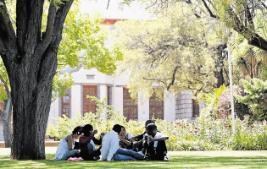
By: Jeanette Chabalala, News24
Bloemfontein - The High Court in Bloemfontein has granted the University of the Free State (UFS) leave to appeal its ruling in favour of civil rights group AfriForum's bid to stop a proposed change to the university's language policy.
Deputy Judge President Fikile Mokgohloa said leave to appeal was granted on condition that the application for leave for direct access to the Constitutional Court is refused.
She said in the meantime university management should put its plans on hold as the matter was currently before the courts.
"The judgment of this court delivered on [July 21] remains in force and is in operation pending the finalisation of the appeals," she said.
The university on Monday argued that the High Court had erred in their decision in July.
Jeremy Gauntlett SC, representing the university, told a full bench of judges that AfriForum failed to establish the absence of irreparable harm on the part of the university and the vast majority of its current and prospective students.
Campus culture
"The court was wrong in their decision. [It] was wrong when they said there was no case of compulsory segregation... another court would come with a different conclusion."
University management has applied to both the Supreme Court of Appeal and the Constitutional Court for leave to appeal.
Gauntlett said in its ruling the court didn't reference their heads of arguments. "There were persistent complaints from students about campus culture and that they do not feel welcome."
However, Johan du Toit SC, representing AfriForum, said justice should be done for students who have already registered in their mother tongue.
"UFS students are exposed to unity and diversity and Afrikaans students shouldn't struggle."
In July, the High Court ruled in favour of AfriForum in their bid to stop a proposed change to the UFS's language policy.
Constitutional issues
At the time Judge Fouche Jordaan said: "The fact that English has been introduced at the UFS, which was a historical Afrikaans university, as a language of instruction does not mean that Afrikaans must inevitably be replaced by English as the dominant language of instruction."
In March the university decided to make English the primary medium of instruction from 2017, while providing sufficient scope for multilingualism across the university.
Jordaan said the UFS council did not consider constitutional issues involved in the decision on the new language policy.
He said while Afrikaans might be a barrier to black students, English was a barrier to many coloured students who had been victims of past discrimination. A move that decreased the Afrikaans offering would negatively affect them.
The university's council said English would be the primary medium of instruction at undergraduate and postgraduate level on the three campuses in Bloemfontein and QwaQwa.
Multilingualism would be supported by an expanded tutorial system designed for first-year students.
In professional programmes the parallel-medium teaching in English, Afrikaans, Sesotho and isiZulu would continue. These included teacher education and the training of theology students who wished to enter the ministry in traditional Afrikaans-speaking churches, where there was a clear market need.
